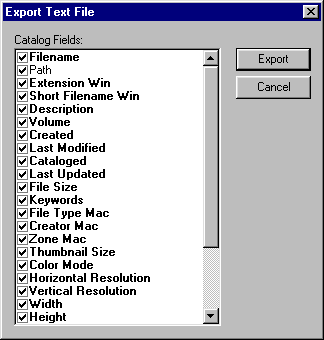You can export your Portfolio catalog data to a text file, and you can specify which fields will be exported and which fields will be skipped. Only data for the selected items in the active Gallery will be exported.
To export catalog fields as text:
In the Gallery window, select the items for which you want to export text data.
To select the entire catalog, choose View > Find All [Command+' (Mac OS) or Ctrl+' (Windows) and then Edit > Select All [Command+A (Mac OS) or Ctrl+A (Windows)].
Choose Export > Text File... [Command+Option+T (Mac OS) or Ctrl+Shift+T (Windows)].
Click in the left-most column of the Catalog Fields list to enable or disable items from export. A checkmark indicates that the item will be exported.

Tip for Mac OS: Click and drag in the checkmark column to quickly add or delete checkmarks for multiple entries.
Click “Export.”
Enter a name for the file and indicate the storage location, then click “OK.”
Portfolio will begin exporting the records and will display a progress bar to keep you posted on its progress. When exporting is complete, you will have a tab-delimited text file containing information from each item record that you selected. In the file, each field within a record is delimited by a tab, and each record is delimited with a carriage return.
Technical Notes about Exporting Text Files
Because the exported text file is delimited by tabs between fields and carriage returns between records, Portfolio cannot use either of these characters within a field, as it will result in an improperly formatted file.
Therefore, Portfolio follows the ASCII standard by using ASCII 11 as the Vertical Tab character. This character will be used to denote a linebreak within a field (such as in a text block like the Description field). Portfolio also uses ASCII 29 as the Group Separator character. This character will be used to delimit values within a multi-valued field (such as the Keywords field). Some other databases that support multi-valued or multi-lined fields (such as FileMaker Pro) also support these standards.